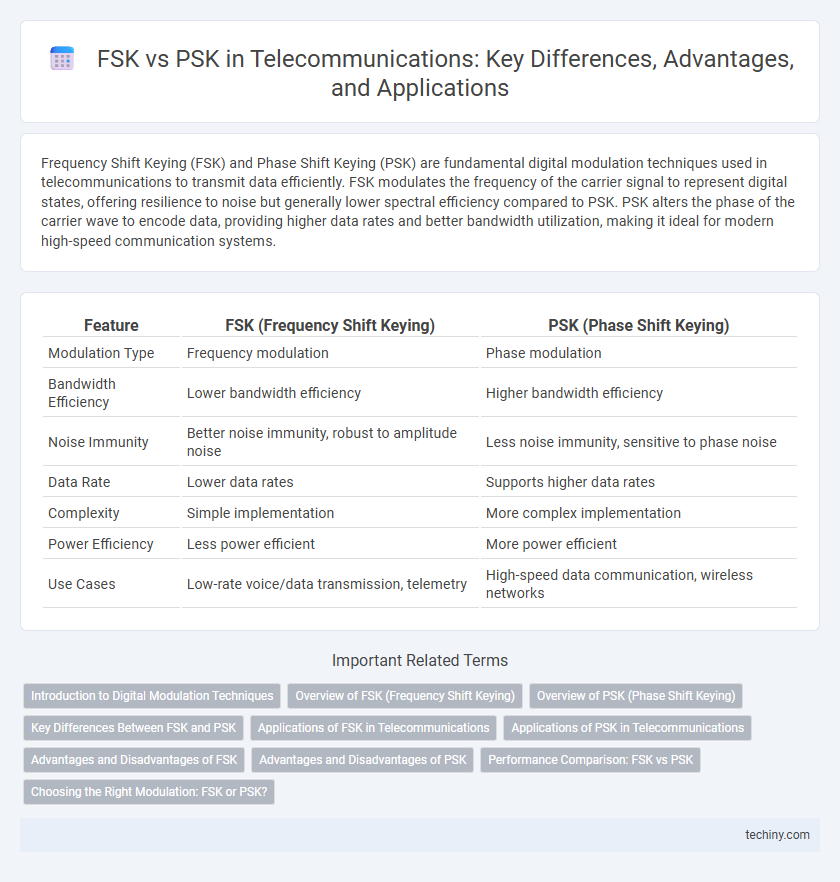Frequency Shift Keying (FSK) and Phase Shift Keying (PSK) are fundamental digital modulation techniques used in telecommunications to transmit data efficiently. FSK modulates the frequency of the carrier signal to represent digital states, offering resilience to noise but generally lower spectral efficiency compared to PSK. PSK alters the phase of the carrier wave to encode data, providing higher data rates and better bandwidth utilization, making it ideal for modern high-speed communication systems.
Table of Comparison
| Feature | FSK (Frequency Shift Keying) | PSK (Phase Shift Keying) |
|---|---|---|
| Modulation Type | Frequency modulation | Phase modulation |
| Bandwidth Efficiency | Lower bandwidth efficiency | Higher bandwidth efficiency |
| Noise Immunity | Better noise immunity, robust to amplitude noise | Less noise immunity, sensitive to phase noise |
| Data Rate | Lower data rates | Supports higher data rates |
| Complexity | Simple implementation | More complex implementation |
| Power Efficiency | Less power efficient | More power efficient |
| Use Cases | Low-rate voice/data transmission, telemetry | High-speed data communication, wireless networks |
Introduction to Digital Modulation Techniques
Frequency Shift Keying (FSK) and Phase Shift Keying (PSK) are fundamental digital modulation techniques used in telecommunications to transmit data by varying signal characteristics. FSK encodes data through discrete frequency changes, making it robust against noise but less bandwidth-efficient compared to PSK, which modulates the phase of a carrier signal to represent data bits. PSK offers higher spectral efficiency and improved data rates, essential for modern communication systems requiring reliable and high-speed transmissions.
Overview of FSK (Frequency Shift Keying)
Frequency Shift Keying (FSK) is a digital modulation technique where data is transmitted by varying the frequency of a carrier signal between discrete values, representing binary states. FSK is widely used in telecommunications for its robustness against signal degradation and noise, making it suitable for low-bandwidth and wireless communication systems. Key advantages of FSK include simplicity in implementation and reliable performance in environments with limited power or interference.
Overview of PSK (Phase Shift Keying)
Phase Shift Keying (PSK) is a digital modulation technique used extensively in telecommunications to transmit data by varying the phase of a carrier signal. PSK offers improved bandwidth efficiency and better noise immunity compared to Frequency Shift Keying (FSK), making it ideal for high-speed data communication. Common variants such as BPSK, QPSK, and 8-PSK provide scalable data rates and robust performance in wireless and satellite communication systems.
Key Differences Between FSK and PSK
Frequency Shift Keying (FSK) modulates digital data by varying the frequency of the carrier signal, while Phase Shift Keying (PSK) changes the phase of the carrier wave to convey information. FSK offers robustness in noisy environments with a straightforward implementation but generally requires a larger bandwidth compared to PSK, which provides better spectral efficiency and higher data rates. PSK's sensitivity to phase variations demands precise synchronization, unlike FSK, which is less susceptible to timing errors.
Applications of FSK in Telecommunications
Frequency Shift Keying (FSK) is widely used in telecommunications for applications requiring robust and simple modulation, such as caller ID transmission, low-speed modem communications, and radio frequency identification (RFID) systems. Its resilience to noise and interference makes FSK ideal for wireless sensor networks and telemetry systems where signal integrity is critical. FSK also finds application in emergency alert systems and early digital cordless phones, offering reliable data transmission over varying channel conditions.
Applications of PSK in Telecommunications
Phase Shift Keying (PSK) is widely used in telecommunications for efficient data transmission over noisy channels due to its robustness and higher spectral efficiency compared to Frequency Shift Keying (FSK). PSK variants such as Binary PSK (BPSK) and Quadrature PSK (QPSK) are integral in satellite communication, Wi-Fi networks, and cellular systems, enabling reliable digital signal modulation and demodulation. The use of PSK in modern wireless communication standards like LTE and 5G supports high data rates and improved bandwidth utilization, which are critical for advanced mobile broadband and IoT applications.
Advantages and Disadvantages of FSK
Frequency Shift Keying (FSK) offers robust noise immunity and simple implementation, making it highly reliable for low-bandwidth and noisy environments in telecommunications. However, FSK suffers from lower spectral efficiency and slower data rates compared to Phase Shift Keying (PSK), limiting its use in high-speed or bandwidth-sensitive applications. The trade-off between FSK's stability and PSK's higher data throughput must be considered when designing communication systems.
Advantages and Disadvantages of PSK
Phase Shift Keying (PSK) offers higher spectral efficiency and better noise immunity compared to Frequency Shift Keying (FSK), making it ideal for bandwidth-constrained telecommunications systems. PSK's ability to encode multiple bits per symbol increases data transmission rates, but it requires more complex receiver designs and precise phase synchronization. The higher sensitivity to phase errors in PSK can lead to increased bit error rates in environments with phase noise or fading channels.
Performance Comparison: FSK vs PSK
Frequency Shift Keying (FSK) offers robustness against noise and interference, making it suitable for low to moderate data rates in wireless communication. Phase Shift Keying (PSK) achieves higher spectral efficiency and better bandwidth utilization, delivering superior performance in high data rate applications with improved bit error rate (BER) under additive white Gaussian noise (AWGN). The choice between FSK and PSK depends on the specific requirements of signal power, bandwidth availability, and system complexity in telecommunications networks.
Choosing the Right Modulation: FSK or PSK?
Choosing the right modulation scheme between Frequency Shift Keying (FSK) and Phase Shift Keying (PSK) depends on the specific requirements of the telecommunications system, such as bandwidth efficiency, noise immunity, and implementation complexity. FSK offers robust performance in noisy environments and simpler demodulation, making it ideal for low data rate applications or RF systems with high interference. PSK provides higher spectral efficiency and better data throughput, suitable for high-capacity digital communication systems where bandwidth is limited.
FSK vs PSK Infographic

 techiny.com
techiny.com